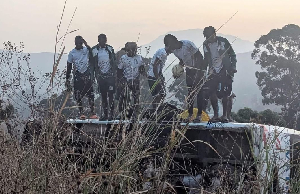Sometime ago, a debate on Boko Haram came to the fore in some columns of L’Effort camerounais. The debate centred on the havoc Boko Haram is causing in Nigeria and now Cameroon. It further addressed the Church’s stance on this issue and spoke about the Theory of a Just War and how terrorist challenges could be handled in Africa.
This debate is of vital importance and should not be allowed to slip from public view. But the Theory of a Just War was mostly used to defend the fact that the terrorist group must be destroyed so that our country and Nigeria can be freed from a deadly threat. This point deserves our careful attention as it is one of the core issues in this article.
A small number of zealots, convinced they know God more than anyone else, have been capable of almost anything. It is a fallen world threatened by agents of terror who kill without conscience and beat, bomb, and lynch unarmed civilians in the name of religion. This is what Boko Haram is doing for a living. What role can a Christian play today in West or Central Africa in grappling with insecurity?
With Boko Haram, there is no doubt that we are dealing with a ruthless enemy. Although the work of dialogue with them may appear discouraging, I believe it is not one day too soon to begin. It is right to stop Boko Haram, but it is not right to stop it with a bomb.
Many are strangely unaware of the politics on which Boko Haram sharpens its iron tooth. Its victims in Nigeria who know it better know it is hot soup that you do not gulp down at once. Boko Haram is a complex mixture of wild politics and wild religion that produces a toxic brew intoxicating entire peoples. So we do not need war to destroy it.
In Cameroon we need to teach ourselves not to be afraid of the unknown and the complicated by confronting the hard topics of our country’s predicament.
What we need is more patriotism rather than narrow ethnic and religious sentiments, the type that has ruined Nigeria since its independence. We need to tackle corruption because it unfortunately gives birth to such monsters of social divide.
I remember, in one of those fine traditional African evening fireside chats, we were taught by our father that when you see a big python ready to bite you, do not wait until it strikes before you crush its head. Naturally anyone who detonates a car bomb in a market deserves to spend the rest of his life roasting over an open fire or to have his head chopped off. This is the day-to-day logic. But we do not have to do that because if we do we shall descend to our enemy’s level. We should not kill because unlike them we are Christian. The python may strike, but it is only a python and human beings are higher than pythons. The collapse of America’s tit-for-tat foreign policy is a warning to all war mongers.
A Christian’s position should rather be peacemaking not war mongering. His pacifism is active not passive and his warring attitude is that of a lover not a monger. Jesus’ words are precise: “Blessed are the peacemakers, for they shall be called sons of God”. These words form the foundation of Christian ethics on war and terrorism. Yet there are no easy answers or simple solutions to these things for we are not die-hard pacifists who say violence is never justified.
It is said that the kind of simplistic peace we opt for is dangerously naive. Some have quoted St. Augustine’s City of God to support the thesis that dialogue is sometimes a fool’s errand and war is necessary simply because man is fallen. On this topic the Church is loaded with experience gained many generations after Augustine that the brilliant but small brain of an Augustine cannot equal that experience. The Church speaks like an adult mother, and says: “Look my children, there was a time I believed that war was inevitable and thus sought to put some strict just war conditions to limit its effects. I have championed holy wars, fought crusades and brought some small peace with the Inquisition. I have seen a thing or two and have observed that those things do not help. Today I have changed the rhythm of the dance; I have adopted a different style that says peace is possible, so let us work tirelessly for peaceful solutions and stop joking with human life in the name of war.”
Time and again, religious fundamentalism raises its ugly head in all religions because fanatics seem to be everywhere. In fact, just as we call on Moslems to speak out against violence, so too must Christians and African traditionalists openly challenge those who foster hatred in the name of faith. This means the ill-informed rhetoric of some preachers about Islam as well as the callous certainty that Jesus will arrive in the next couple of weeks arrogantly lectured on pulpits these days will have to stop. Even in world politics, the common language today is about peacekeeping, peacemaking, diplomacy, dialogue and humanitarian intervention. The Theory of a Just War has gained unpopularity in the post-World War II and post Vatican II era. Before, the moral agent of any war in the Just War Theory was a sovereign state. In the Church’s eyes today that moral agent must only be an International Organisation (UNO for example) recognised by the world’s peace-loving people. A country dares not declare war on another - whatever sanctimonious reasons it may hold - in the name of just war. But we do not talk about just war when we are after terrorist groups. We talk about stopping Boko Haram.
Boko Haram provides hard but important lessons about the dangers all around us. First, that religion is an amazingly powerful force but can be vicious too when masterminded by troublemakers. Second, that politics devoid of God is a wide open road to misery and that politics mixed with the toxic brew of religion, the type witnessed in Iraq, Iran, and now neighbouring Nigeria, is hell let loose. Third, that an individual terrorist can blow up a whole town. Fourth, that quite apart from chemical, nuclear or biological weapons, a devious local plan can use automatic arms, box matches, knives, “garri” stuff, fertilisers and commercial buses for mass destruction.
Man hardly learns from history. We have tried to work out conflicts by our own power and by the force of arms. Our efforts have been in vain. It is high time we try God and his peace! Since St. Pope John XXIII the Church has repeatedly spoken about peace, not the peace of the Just War Theory. Yes, contrary to the rest of mankind let us enlist for ourselves an army without weapons, without war, without bloodshed, without wrath, without stain. Our troubled generation is in dire need of loyal combatants to the Most High’s army.
Opinions of Monday, 29 September 2014
Auteur: Fr. Gerald Nyuykongmo Jumbam














